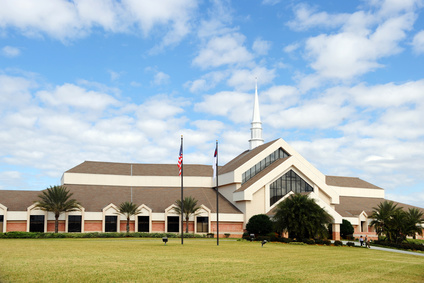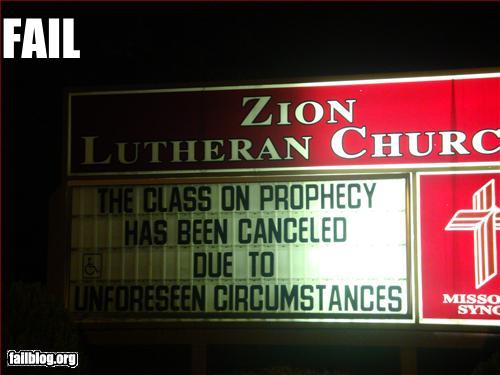
I have only been in ministry about 14 years. In that time, I have been part of two revitalization churches and two church plants. We have been graced with tremendous growth in all four churches. One church was a smaller church, but the other three have grown to be considered larger churches. I grew up in a large church. So, that is most of my church experience.
It goes through seasons, but periodically I will hear less than positive remarks from people about their perception of growing or large churches. Sometimes it comes from within the church — someone who may struggle as the church experiences growth — which always means change. The majority of time, however, the criticism comes from people outside the church making observations about the church.
And, those are the comments I’m addressing here. Comments from people who really do not have experience with larger or growing (especially fast-growing) churches.
These comments are usually well-meaning in terms of the person’s concern for the church. At least, I’m willing to assume. But, they are usually also generalized and often given without complete understanding about the specific church.
These type comments are easily repeated. Some people love to talk. If we are not careful, they become detrimental to the Kingdom. Because some of them — I would even say most — are simply not true. At least in the churches with which I’ve been affiliated directly. (Which are really the only churches we can definitively criticize. And, even then, the larger the church the harder it is to understand all that is taking place within in it.)
Here are 7 unfair criticisms of growing or large churches:
“All you care about is the numbers.”
This is always a funny one for me. Most of the time people who say this are in churches that also count numbers. I’ve been in some very small churches that even post their numbers on the wall in the back of the church. Numbers are important. In all churches. Because they represent people. For me, I don’t want to pastor a growing church where people aren’t equally growing in their individual walk with Christ. Every large church pastor I know personally feels that way. But, to know this one, whether you’re in the church or not, you’d really have to know the heart of the people in positions of leadership. I know this, however, it is certainly not a fair generalization of large or growing churches.
“You are just stealing people from other churches.”
I have found in my ministry a couple of things to be true. First, once someone is involved in their church it is a very difficult decision for them to ever leave. Regardless of the size of the church. Unless they are moving to the community or there is some major uproar in the previous church, it is fairly rare that a truly committed church member joins another church. Second, some people change churches frequently. If you look at their life over a span of decades they will have been in numerous churches. I have known some churches where their primary growth comes from conflict, church splits, or transferred growth. But, these are rare, in my opinion, and have not been the case in churches I have been affiliated with directly.
“You have too much flash and not enough depth.”
Again, this is a funny one to me. The people who are looking for depth – who know enough to be looking for depth – – it would seem to me would know that real depth; real maturity almost always occurs in much smaller settings. The worship service is only one part of discipleship. And, whether a church averages 40 or 4,000, there will need to be some smaller settings for people to grow deeper spiritually.
“People aren’t growing.”
I can’t remember how many times I’ve heard a comment such as, “the larger the church the more immature people you seemed find.” That’s a funny comment to me because I was always pretty good with math. It makes sense to me that more produces opportunity for more. More people — more potential for people who aren’t growing. Something tells me there are some immature people in smaller churches too. (Maybe even some of the ones who spread unfounded generalizations about other churches. Uh oh. Did I say that?)
“People aren’t cared for properly.”
That may be true. And, it might not be. Same would probably be true of smaller churches. In a large church you may not see the pastor every time you’re sick, but if they have a good care system you’ll be cared for in a Biblical community. I have witnessed countless stories of that in some of the churches in which I’ve been a part.
“You won’t get to know anyone.”
That would be like saying if you work at a large company you wouldn’t know anybody you work with. Not true. You won’t be able to just attend the large gathering, never speak to anyone, and expect to develop deeper relationships. But, something tells me, in every large or growing church there will be opportunities to get to know people.
“It’s all about the money.”
As with many of these, you have to think of things in a relative way. It is true that large churches require more money to fund the ministry. Again, that’s just math. But, all churches have a budget. It’s almost always proportional to the size of the church. I have loved watching some large churches that actually are very kingdom-minded and bless churches of all sizes. It’s been amazing to me, for example, to watch as our status church blesses smaller churches. This was something that was happening before me – so it’s not about me. But, I love it.
Here is my advice:
Be careful with generalizations. Look under the hood before you critique the engine. And, never throw stones at what you don’t know.
In fairness, people cast false impressions towards the church that isn’t growing. And, I certainly wouldn’t say that every church in decline or that has plateaued is “making disciples”. Some probably are. Some not as well.
People also make false impressions about small churches. Most of which are probably equally unfair. I have some good friends who are making huge Kingdom impacts in a smaller church. (I’d consider a well-written “7 misunderstandings of small church” guest post.)
Let’s be supporters of churches of all shapes and sizes. Let’s look for fruit, certainly consider the teachings, but take the entire ministry of the church into consideration before we offer generalizations — and certainly before we criticize someone with whom we are supposed to be on the same team.




I don't care at all about the size of churches but I do care about geography. The only division I can find in the New Testament churches is geographical. I wish that Christians would have a passion to really be salt and light in their own communities rather than driving 30 minutes to a church outside their own communities. If we care about the people right around us then why would we not want to be a part of a local church where we can eventually help them be a part of.
I have noticed that the people drive out of their communities to attend a church that "meets their needs" tend to be the same people that have little concern for the lost and dying world all around them. If we are to be like a New Testament church then let us be the church in our own towns, communities and neighborhoods.
Some good thoughts here. Thanks for sharing.
Spot on. We must consider the fruit before making generalizations.
Thank you!
Great thoughts here. It occurs to me that little churches and big churches have the same challenges. Some churches are big because they are healthy and they attract Christians who are hungry for healthy food. Some churches are big because they aren't healthy and attract Christians hungry for the tasty spiritual junk food being served there. One produces healthy Christians with strong spiritual muscles empowered by the Holy Spirit and the other produces obese Christians. Perhaps I'm caricaturing this a bit, but it's to make a point. All churches large and small fall on a spectrum between the two extremes. It's easy for people from small churches to exhibit some unhealthy qualities and begrudge healthy large churches because of the unhealthy ones. It's easy for people from large churches to exhibit some unhealthy qualities and turn up their noses at healthy small churches because of the unhealthy ones. The pastor of a system of satellite churches that grew from zero to thousands seemingly overnight in a nearby city, several years ago put out a video where he severely disrespected local, small, more traditional churches. The video has since been retracted, but the damage was done.
The point is that we all stand to grow more healthy, and God uses the small churches as well as the large churches. Far more pastors will find themselves in small churches than in large churches, and that's a good thing. I spent a couple of years in a row in India speaking at a pastor's conference where most of the pastors had little to no training and were leading little house churches dotted all over the country. Nevertheless, I was in awe at the gifts that God had given their respective churches in these men and humbled by being able to help them in some way in their ministry. In my big church in the States, I'm a second-rate teacher in the buckle of the Bible Belt, rich with first-rate teachers and preachers. But out there where Christianity is the minority among religions, there are men being used by God to win people in their neighborhoods for Christ week in and week out from small pulpits in small houses to small congregations strengthened in some way through our ministry. And God is glorified greatly through large and small alike.
Amen. Thank you for this. Good words.
Well stated, thank you!
The "funniest" comment that was made to me directly was when I reintroduced myself to a pastor of a church in our city. His church was our voting precinct temporarily and I was there to vote. I introduced myself to him, in the course of the brief conversation he asked me if I had a church home (nice work!). I said yes, that we were very active members of XYZ Bible Church. "So you're one of the people who goes to the church that's stealing our members!" and he walked away…
What he couldn't have known was that at that time I was very involved with membership classes and assimilation ministries. What I knew from talking to some of the people that used to go to his church was the big why of the need for them to leave his church. If he hadn't walked away I would have spent a bit of time over a cup of coffee gently informing him. The good news is that 6 months later he was gone and the new pastor and his family are putting into place things that are now growing the church.
That's a great report. Thanks for sharing your story